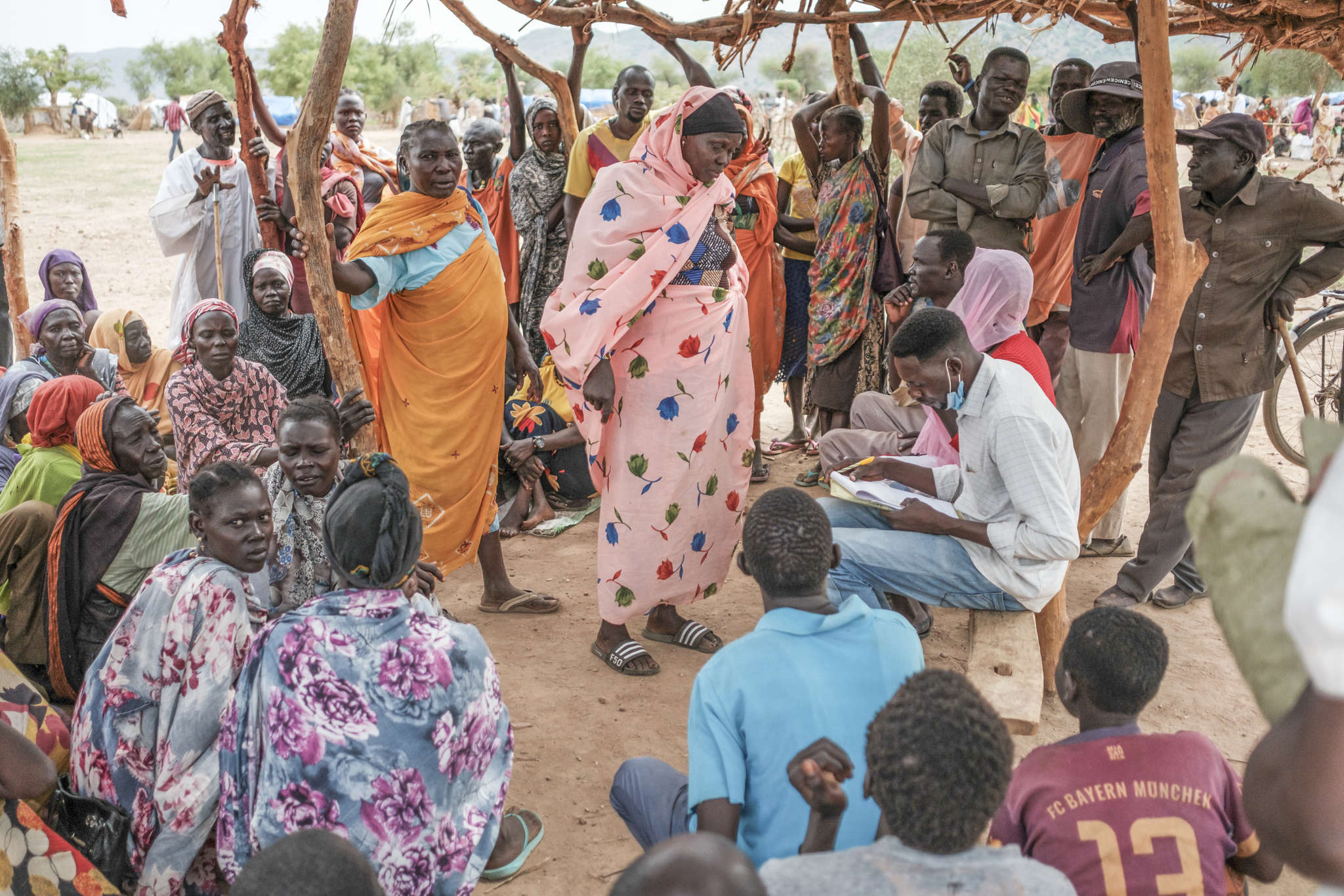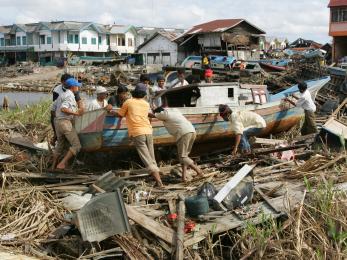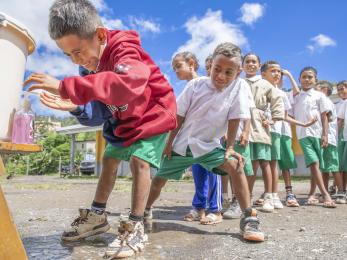Rebuilding in Ukraine: Displaced communities on the path to recovery
Adapting to life in the midst of conflict requires a continuum of support

Even as the full-scale invasion of Ukraine enters its third year with no end in sight, residents continue to endure – finding ways to persevere and heal amidst the devastation. The ongoing conflict in Ukraine has left more than 14 million people in need of humanitarian aid, internally displacing nearly 4 million residents. Since the escalation in 2022, Mercy Corps has supported more than 860,000 people affected by the conflict in Ukraine and neighbouring countries. To meet the specific needs of those whose lives have been upended, Mercy Corps partners with local organisations most familiar with these communities to provide urgent aid to those in active conflict zones, while also offering more long-term support to those building toward self-sufficiency.
Emergency aid continues to meet urgent needs
Mercy Corps supports people in both the immediate aftermath of displacement and during the long road to stability. To help families cope, a continuum of support is necessary. Emergency kits are the most common first step, followed by shelter support, multipurpose cash assistance, and mental health services. Once stabilised, entrepreneurial training and small-business grants support both communities and individuals as they reclaim their lives and their self-sufficiency.

Raisa* didn’t want to leave her hometown in the Donetsk region, but increasing violence and constant explosions forced her to flee to the Ukrainian city of Zaporizhzhia where she’s now living with her daughter and son-in-law. “We need everything,” Raisa said. “We need all the humanitarian aid.” Upon arrival in the new town, Raisa received a hygiene kit distributed by a Mercy Corps partner organisation, Pomagaem Charitable Trust. Essentials like hygiene products help to meet the everyday needs of vulnerable populations, such as the elderly, as they are often forced to flee with little more than what they are able to carry.
Mental health services create connection

When the full-scale invasion began, Yuliia* and her three children stayed in an underground shelter for five months. Though they’re back in their home now, constant sirens and explosions continue to destabilise their sense of safety. To get out of the house, Yuliia and her two youngest daughters began attending art therapy classes at a community centre run by Perspectyva, a Mercy Corps partner. Her daughters feel more at ease and happier there, where they have opportunities to connect and build friendships with the other children.
Sustained access to mental health services is crucial for people who want to go back to work, care for their families, and participate in rebuilding their communities. Yuliia attends group therapy sessions at the centre, which make her feel like a weight has been lifted. She gets the support she needs to help process her traumatic experiences. “I can express everything that bothers me here,” she said, “and I feel very lighthearted afterwards.” The connection Yuliia has found at the centre makes her feel more hopeful. “There will be peace in this world after all,” she said, “and our children will start to live fully.”
Shelter support and cash assistance provide stability

Mercy Corps helps to provide shelter for internally displaced people through a multipurpose cash assistance programme, which allows families to prioritise what they need most, whether it is food, medicine, clothing, basic household items, or housing expenses.
Tetiana, a mother of four, was displaced from her village because of the war. The cash assistance she received through Mercy Corps’ local partner organisation Perspectyva, was key to helping secure an apartment in Mykolaiv for several months – freeing up more of her family’s money for food and baby formula for her youngest. While she’s grateful for stable and safe housing, she’s counting the days until it’s safe to return to her village. “[I have] faith in a bright future,” Tetiana said, “that we will return home.”
Microbusiness grants enable entrepreneurs to reclaim livelihoods
To help communities affected by the conflict, Mercy Corps supports entrepreneurs, business owners, and farmers to rebuild economic resiliency through grant programmes. By growing their businesses and earning stable incomes, grant recipients are able to decrease their reliance on aid while also supporting the recovery of their larger communities.


Daryna* has been sewing for over 20 years, creating and restoring culturally significant Ukrainian clothing and textiles. She also worked as a tour guide in Bakhmut (Donetsk region), taking visitors through the history and culture of her hometown. She was devastated to flee from Bakhmut to Dnipro, where her home was completely destroyed. “The city for me... my home is my city,” she said. “I know that my city smells like wet bricks after the rain. I know that it tastes like the bitterness of asters or marigolds. I’ve been to many different countries before the full-scale invasion, and I’ve traveled around Ukraine a lot. But there is no better city than mine.”
Through a microbusiness grant programme, implemented together with our partner organisation Free People Employment Centre, Daryna bought a sewing machine and iron for her small business sewing and selling traditional clothing, dolls, and other textiles. With the new equipment, Daryna’s business is back to nearly full capacity, allowing her to save money with the hopes of someday returning to her beloved hometown.
Small business grants encourage hiring and employment across communities

After the full-scale invasion began, Kostiantyn’s ceramic heating tile production building was destroyed along with all the equipment inside. Aided by a grant from Mercy Corps, Kostiantyn has been rebuilding his business. He’s hired six employees in the new space so far and hopes to scale up to 30 staff in the near future.
He wants to increase production to 30,000 heating plates per month, which would lower the cost of the tiles to make them more accessible to families and businesses across the country. The re-established business has already impacted nearby communities, providing a safe and reliable heating option for hospitals and schools.
Grants like these help people reclaim not just their livelihoods, but also ripple throughout communities in the form of job creation, stable income, and reinforced economic resilience.
Larger-scale assistance helps communities rebuild economic and food security
Yelyzaveta* and her husband, Serhii*, fled their village when it was overtaken and under military occupation in 2022. Upon returning months later, they found that much of their home and 600 hectares of land had been destroyed. “We have a lot of small farmers and people who are engaged in working only on their land,” said Yelyzaveta, reflecting on how this has impacted the agricultural community. “This is the income we can get here. We don’t have any other income.”


Agriculture is the economic backbone of their community, so they were devastated to find all of their equipment had been stolen or destroyed, and their solar panels were damaged beyond repair. They have slowly been rebuilding after receiving a grant from Mercy Corps and our local partner organisation, Laska, to buy a tractor and restore their warehouse. Since there’s a shortage of agricultural equipment, the new tractor is crucial, as it allows them to work on their land and assist nearby homesteads. The restored warehouse helps other local farmers to store their grain after harvest and sell it at optimal times, maximising their profit. This kind of large-scale grant assistance uplifts whole communities and helps local industries to rebound – with the potential of scaling recovery to entire regions. “Ukrainians are a strong nation,” said Serhii. “We are very proud to be Ukrainians. You cannot take that away from us. It’s in our blood.”
Ongoing aid supports a range of resilience

Through partnerships with local organisations, Mercy Corps fills the gaps in aid for the most vulnerable communities across Ukraine. Tapping into the local knowledge of on-the-ground organisations deeply informs our work – ensuring that humanitarian aid is tailored to the specific needs of those most affected by the conflict. By directly supporting both urgent needs and long-term self-sufficiency for individuals and communities, Mercy Corps is helping Ukrainians regain autonomy. As they wait for an end to the conflict, continued international assistance is crucial for Ukrainian families and small businesses who are working hard to stay safe, sheltered, and financially secure while adapting to new surroundings and circumstances. Together, we are implementing and scaling the solutions that war affected communities need to rebuild toward a peaceful and more resilient future.
*Names have been changed for privacy



